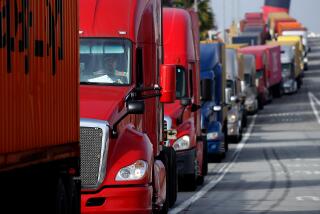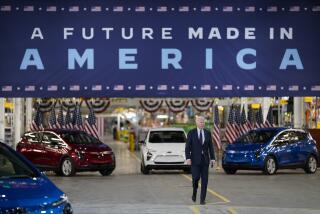Editorial: Cleaner trucks are good. A higher sales tax to pay for private companies to get them isn’t.
California voters (and the Times Editorial Board) have supported a variety of tax hikes and bond measures in recent years because the new revenue was essential for building vital public infrastructure, from schools to subways to homeless housing.
Now Southern California air quality regulators are considering putting a quarter-cent sales tax increase on the 2020 ballot to raise an estimated $700 million a year, much of which would be used to pay truckers and goods movement companies to switch their dirty diesel big-rigs to low-pollution models.
That’s a tax too far.
Most tax measures are used to pay for public infrastructure and services. Voters are asked to tax themselves to invest in shared resources, like parks and roads, or to finance initiatives that have broad community benefits, such as restoring wetlands, building permanent supportive housing or hiring more schoolteachers.
This proposal is different. Southern California residents would be asked to tax themselves to pay for privately owned equipment in a for-profit industry. Why should we have to subsidize the international, multibillion-dollar retail and logistics industries to get cleaner trucks?
There’s no question that the region’s smoggy, soot-filled air is unhealthy. The South Coast Air Quality Management District has an enormously difficult job in cleaning the skies. The agency has the authority to regulate stationary sources of pollution, such as power plants, factories and refineries. But 88% of the region’s smog-forming pollution is created by vehicles, which are regulated by the state and federal governments.
Despite having limited power to go after the most prolific polluters, regional leaders are facing a 2023 deadline to dramatically cut emissions to meet Clean Air Act standards. The sales tax measure offers one possible solution to this problem: a huge pot of money that could be used to incentivize the trucking industry to switch to cleaner engines.
But while the proposed tax-hike scheme would probably cut smog and soot faster than maintaining the current set of policies, it would push the burden of cleaning the air from the polluter onto the taxpayer. It would let trucking companies, retailers and the logistics industry off the hook for the cost of operating in an environmentally responsible fashion. And it would ease the pressure on the Trump administration to tighten the emissions limits for interstate trucks.
Goods movement is certainly an important part of the Southern California economy. Roughly 35% of the nation’s cargo containers arrive at the ports of Los Angeles and Long Beach and pass through the region en route to warehouses and big-box stores across the country. Retailers, manufacturers and their customers nationwide ought to cover the costs of cleaning up the industry. To foist the expense on Southern Californians simply because the cargo containers full of televisions, clothing and other goods pass through here on the way to Kansas is just unfair.
Follow the Opinion section on Twitter @latimesopinion and Facebook
More to Read
A cure for the common opinion
Get thought-provoking perspectives with our weekly newsletter.
You may occasionally receive promotional content from the Los Angeles Times.






